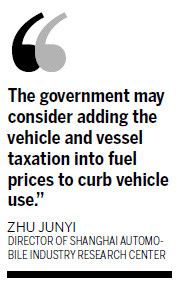Cars
Car tax law part of drive to promote clean energy
By Li Fangfang and Wang Xiaotian (China Daily)
Updated: 2010-10-26 13:48
 |
Large Medium Small |

Draft suggests amount paid be based on vehicle engine capacity
BEIJING - A new tax law, to encourage the use of smaller engines in vehicles and vessels to reduce pollution and oil dependence, is under consideration.
The top legislature on Monday began its first review of the draft law, which was passed at an executive meeting of the State Council on Oct 12, during the 17th Session of the 11th National People's Congress Standing Committee.
The draft law, expected to be finalized by spring, seeks to cut taxes on fuel efficient, clean energy vehicles while imposing increasing taxes based on engine capacity.
Taxes on vehicles with an engine capacity smaller than 1.6 liters - which account for 58 percent of Chinese cars - will be either reduced slightly or unchanged, Finance Minister Xie Xuren said in his report to the legislature on Monday.
Taxes on vehicles with an engine capacity between 1.6 and 2.5 liters will see a "moderate" increase while a "relatively large" increase will be imposed on vehicles with an engine capacity greater than 2.5 liters, he said.
Taxes on vessels will remain unchanged while taxes on motorcycles, three-wheel motor vehicles and low-speed trucks, mainly used in rural areas, will be reduced or remain unchanged, according to the draft law.
"The main aim of the law is to reduce energy consumption through effective fiscal and tax measures," said Jia Kang, director of the Research Institute for Fiscal Science at the Ministry of Finance.
"The larger engine capacity a car has, the more tax the owner will pay, therefore the law will be effective in improving energy efficiency and cutting emissions," said Chen Shaoqiang, also an institute researcher.
The institute's deputy director, Liu Shangxi, told China Daily that reforming the collection of vehicle and vessel tax, which accounts for a small portion of local government tax revenue, could play a positive role in the national tax framework.
The law will be part of the government's fiscal reform measures over the next five years, experts said, by broadening the tax category and improving local government revenue to reduce dependence on land sales.
"Engines with a smaller capacity do not mean lower emissions," said Jia Xinguang, an independent auto analyst.
It could instead raise costs for many car users.
"It's not an effective weapon to limit the sales of vehicles with large engine capacity, as buyers of these vehicles often do not care about prices or taxes," said Zhong Shi, another independent auto analyst.
He noted that in 2008 the government tried to curb the sale of these vehicles by raising consumption tax.
"They (the policymakers) should realize that the use of fuel, not the capacity of the engine, is key to energy consumption," said Zhong.
One industry expert said the government might include the tax in fuel prices.
"The government may consider adding the vehicle and vessel taxation into fuel prices to curb vehicle use. You have to pay more tax if you drive more," said Zhu Junyi, director of the Shanghai Automobile Industry Research Center.
Currently, the annual tax on passenger vehicles in China ranges from 360 yuan ($54) to 660 yuan, based on the 2007 law.
China has 199 million motor vehicles. The nation sold 13.6 million cars last year, overtaking the United States as the world's biggest auto market.
Xinhua contributed to this story.



